Naqi Rizvi loves the “absolute freedom” he feels on the tennis court.
Winning titles is fun, too.
The 34-year-old blind tennis champion is on a mission to not only raise awareness, but also elevate the sport into the Paralympics.
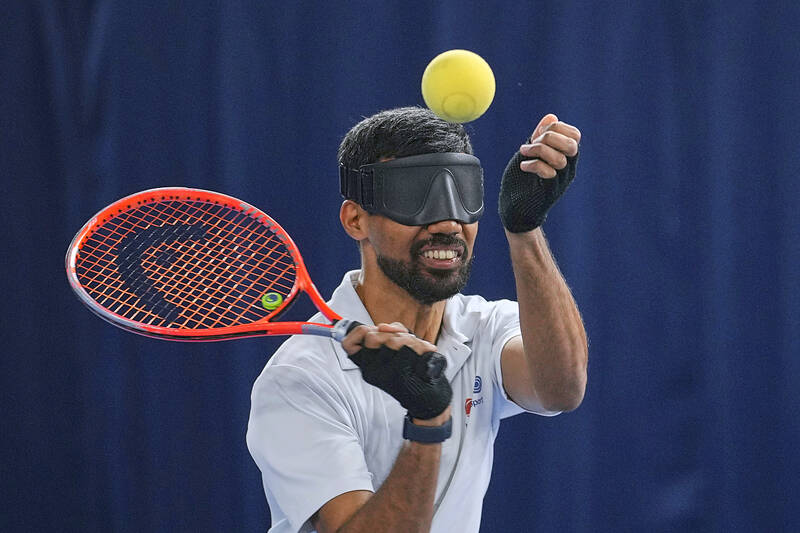
Photo: AP
“That would be the dream, and I’d love to be the first Paralympic champion if I can,” Rizvi said.
The London resident, fully blind from the age of seven because of congenital glaucoma, only took up the sport a decade ago and is now the No. 1-ranked men’s player in the world for his category.
Also an avid runner, Rizvi has completed two marathons and although jogging with a guide is great, tennis offers more.
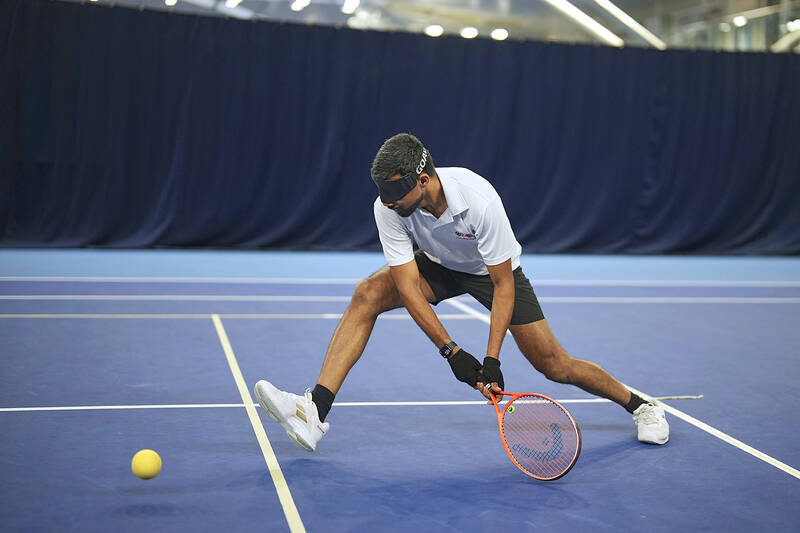
Photo: AP
“On a tennis court, I have absolute freedom because I know where the boundaries are, no one needs to tell me which way to turn, I don’t need to have a cane or anything of this sort,” he said during a practice session at the National Tennis Center in southwest London. “It’s just the absolute sense of freedom to know that I can run comfortably, make my own decisions, and then be able to play points or rallies. It’s just incredible.”
The rules are basically the same as mainstream tennis, just with smaller dimensions and a slightly lower net. Tactile lines are taped onto the court so players can feel the boundaries. Depending on the level of visual impairment, you are allowed up to three bounces of the ball. The foam ball contains a bell so players can audibly track it.
“What I find interesting about blind tennis is it’s incredibly technical,” said Rizvi, who also possesses a big serve.
The problem-solving aspect of the sport is something Rizvi enjoys — no surprise given that he studied engineering at University College London.
“You really need to anticipate after you’ve heard the first bounce where the second and third will be,” he said. “You obviously can’t see how your opponent has hit the ball, so it’s a lot of anticipation and a lot of practice and getting used to different trajectories that the ball can take.”
Rizvi did not even know that tennis was an option until he visited Metro Blind Sport in London a decade ago. He was hooked right away.
“I can almost assure you that if you did a survey of blind and partially sighted people,” he said, “the majority of them wouldn’t have any idea because it’s not televised, it’s not in any other mainstream events, so how are people supposed to find out?”
The Lawn Tennis Association supports a visually impaired program that includes practice sessions at the governing body’s National Tennis Center. That is where Jack Draper, the world No. 5 player, tried out the different levels. The association also runs tournaments each year and sends teams to international competitions.
Rizvi said that there is not much financial backing in the sport. There is no prize money at tournaments and players often fund their own travel.
“Unless you obviously have the visibility and the money behind it, it’s really hard,” he said. “Governing bodies need to take a more active role and try and give parity to all forms of disability tennis not just the ones that have made it big like wheelchair tennis, for example.”
Invented in Japan by Takei Miyoshi in 1984, blind tennis is played around the world. Last year’s world championships in Italy were the largest to date, with 117 players from 20 countries, the International Blind Tennis Association said.
Rizvi has won several national titles, a European championship, the world championship in 2023 — as well as gold that year at the ISBA World Games. He is also the two-time defending champion of the Play Your Way to Wimbledon tournament.
The International Paralympic Committee handbook spells out that the sport or discipline must be “widely and regularly practiced” in at least 32 countries and three continents.
“I really want it to be in the Paralympics,” Rizvi said, “but I also want this to be a mainstream sport which can be part of the ATP Tour, part of Grand Slam tournaments, just like wheelchair tennis has made such amazing leaps forward. I’d love for blind tennis to be there as well because it’s definitely got the potential.”
“It’s got the countries, the continents, the people, the passion behind it,” he said.
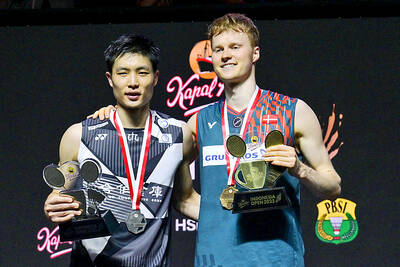
Badminton world No. 3 Anders Antonsen clinched his first Indonesia Open title yesterday after beating Taiwan’s Chou Tien-chen, while South Korea’s An Se-young won her second championship in Jakarta. The 28-year-old Dane sank world No. 7 Chou at the Indonesian capital’s Istora Senayan arena, winning 22-20, 21-14 in a 60-minute match to secure the prestigious Super 1000 event. Antonsen came out on top in a tightly contested first game before cruising to victory in the second. In a more closely fought women’s singles final, South Korean ace and world No. 1 An fought back from one game down to beat China’s

Italy crashed to a 3-0 loss away to Norway, as the four-time FIFA World Cup champions made a disastrous start to their 2026 World Cup qualifying campaign on Friday, while Belgium had to settle for a draw in North Macedonia. Alexander Sorloth, Antonio Nusa and Erling Haaland all scored in the first half in pouring rain in Oslo as Norway made it a night to forget for Italy, who missed out on the past two World Cups. “I have no explanation. Our supporters don’t deserve this kind of match. We need to do some soul-searching. It’s unacceptable,” Italy captain and goalkeeper Gianluigi
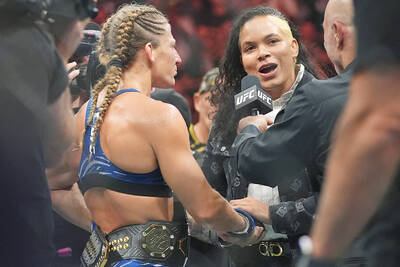
‘STILL’: In front of a packed New Jersey arena attended by Donald Trump and Mike Tyson, UFC 316 delivered high drama as Merab Dvalishvili retained his title Georgia’s Merab Dvalishvili scored a second-round submission win over Sean O’Malley to retain his bantamweight title at Ultimate Fighting Championship (UFC) 316 on Saturday, with Kayla Harrison also winning by submission in the co-main event, tapping out Juliana Pena to claim the women’s bantamweight crown. In front of a packed crowd at the Prudential Center in Newark, New Jersey, which included US President Donald Trump and retired heavyweight great Mike Tyson, Dvalishvili, a 34-year-old from the country of Georgia, won the belt in a convincing, although not aesthetically pleasing, unanimous decision. Dvalishvili (19-4) sat on top of the cage and shouted
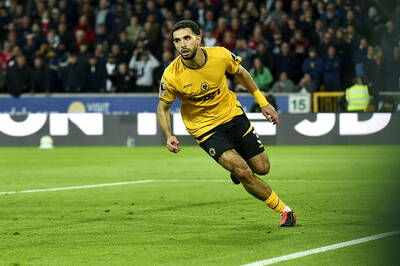
Manchester City on Monday completed the signing of left-back Rayan Ait-Nouri from Wolverhampton Wanderers for a reported £31 million (US$41.8 million). The 24-year-old Algeria international has signed a five-year contract and will be available for the FIFA Club World Cup, which begins later this week. Ait-Nouri is expected to be just one of a trio of new City faces for that tournament with deals close to completion for AC Milan midfielder Tijjani Reijnders and Olympique Lyonnais playmaker Rayan Cherki. After missing out on a major trophy in the recently completed season for the first time since 2016-2017, City are hoping